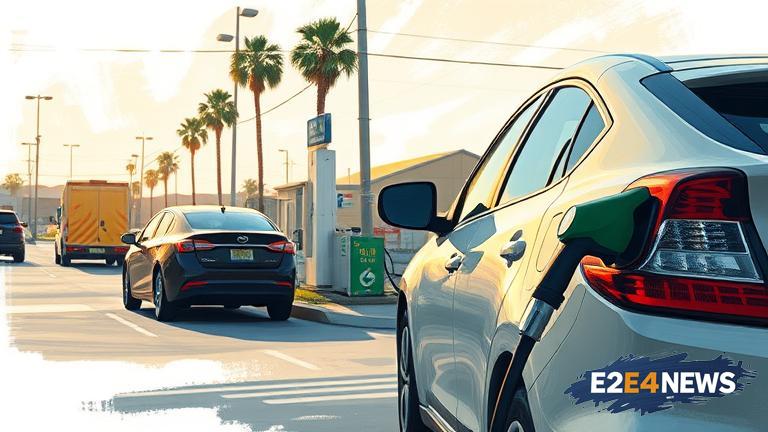The state of California has been at the forefront of the push for electric vehicles, with the government implementing various measures to encourage citizens to make the switch. One such measure is the intentional raising of gas prices, which has been a topic of controversy in recent times. According to reports, the California government is deliberately increasing gas prices to make electric vehicles a more attractive option for consumers. This move is part of the state’s efforts to reduce its carbon footprint and meet its climate change goals. The government believes that by making gas-powered vehicles more expensive to run, citizens will be more likely to opt for electric vehicles instead. However, this move has been met with criticism from some quarters, with many arguing that it is unfair to punish citizens for using gas-powered vehicles. The California government has been actively promoting electric vehicles, with incentives such as tax credits and rebates for those who purchase them. The state has also invested heavily in the development of electric vehicle charging infrastructure, with the aim of making it easier for citizens to own and operate electric vehicles. Despite these efforts, many citizens are still hesitant to make the switch, citing concerns over the high upfront cost of electric vehicles and the limited range they offer. The intentional raising of gas prices is seen as a way to address these concerns, by making gas-powered vehicles more expensive to run and thus more comparable to electric vehicles in terms of cost. However, this move is not without its challenges, with many citizens expressing concerns over the impact it will have on their daily lives. For example, those who live in rural areas or have limited access to public transportation may be disproportionately affected by the increase in gas prices. Additionally, the move is likely to have a significant impact on the state’s economy, with many businesses relying on gas-powered vehicles to operate. The California government has argued that the benefits of the move outweigh the costs, citing the need to reduce the state’s carbon footprint and meet its climate change goals. However, others have argued that the move is a classic example of government overreach, with the state interfering in the free market and dictating what type of vehicles citizens can and cannot use. The debate over the intentional raising of gas prices in California is likely to continue, with many citizens and businesses weighing in on the issue. As the state continues to push for the adoption of electric vehicles, it remains to be seen whether the move will be successful in achieving its goals. The California government has set a target of having 5 million electric vehicles on the road by 2030, and the intentional raising of gas prices is seen as a key part of achieving this goal. However, the move is not without its challenges, and it remains to be seen whether the state will be able to overcome them and achieve its objectives. In conclusion, the intentional raising of gas prices in California is a complex issue, with both supporters and critics of the move presenting valid arguments. While the state’s goal of reducing its carbon footprint and promoting the adoption of electric vehicles is admirable, the move is likely to have significant impacts on citizens and businesses, and it remains to be seen whether it will be successful in achieving its objectives. The debate over the issue is likely to continue, with many citizens and businesses weighing in on the topic. As the state continues to push for the adoption of electric vehicles, it is likely that we will see more measures aimed at encouraging citizens to make the switch. The intentional raising of gas prices is just one part of a broader effort to reduce the state’s reliance on fossil fuels and promote the use of cleaner, more sustainable forms of energy. The move is seen as a key part of the state’s efforts to meet its climate change goals, and it remains to be seen whether it will be successful in achieving its objectives. The California government has argued that the move is necessary to protect the environment and promote public health, and it is likely that we will see more measures aimed at reducing the state’s carbon footprint in the coming years. The intentional raising of gas prices is a significant development in the state’s efforts to promote the adoption of electric vehicles, and it is likely to have a major impact on the state’s economy and environment. As the state continues to push for the adoption of electric vehicles, it is likely that we will see more measures aimed at encouraging citizens to make the switch. The move is seen as a key part of the state’s efforts to reduce its reliance on fossil fuels and promote the use of cleaner, more sustainable forms of energy. The California government has set a target of having 50% of the state’s vehicles be electric by 2035, and the intentional raising of gas prices is seen as a key part of achieving this goal. The move is likely to have significant impacts on citizens and businesses, and it remains to be seen whether it will be successful in achieving its objectives. The debate over the issue is likely to continue, with many citizens and businesses weighing in on the topic. As the state continues to push for the adoption of electric vehicles, it is likely that we will see more measures aimed at encouraging citizens to make the switch. The intentional raising of gas prices is just one part of a broader effort to reduce the state’s reliance on fossil fuels and promote the use of cleaner, more sustainable forms of energy. The move is seen as a key part of the state’s efforts to meet its climate change goals, and it remains to be seen whether it will be successful in achieving its objectives.
